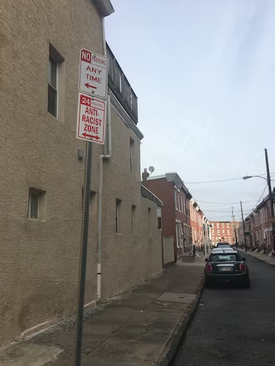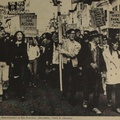Racism against Asian Americans has been in the news recently. There’s often discussion as to whether an attack is a race-based hate crime or not. Yet, there has been anti-Asian hate in the United States as long as there have been Asians. The 1882 Chinese Exclusion Act and the 1942 Executive Order 9066 imprisoning Japanese Americans are well-known examples.
There are different definitions of racism—discrimination, bigotry, bias, and intolerance. I always thought of it as prejudice and negative attitudes toward people of other ethnicities and nationalities for no other reason than one’s perception of the other’s ethnicity (background, culture, or origin) or nationality (race or population).
I learned that a power dynamic is also associated with racism, in which the people in power exercise that power to oppress the powerless. This happens among people in the same group or category as well, however, so I wonder if power is always a part of racism.
In my experience, the “race” in racism is always primary, so that discrimination by a person or group involving ethnicity is always racism even if there is no power difference. I worked in situations where people didn’t want to be identified by their ethnicity despite having every appearance of a particular ethnicity; or were identified as a member of a racial group when their identity was actually multi-racial. Every combination exists.
If there is no power difference in the discrimination, are people just being obnoxious, intolerant, and offensive and not racist?
Memories of Past Incidents
In my everyday life, it is not always clear to me when racism is occurring. The encounters are sometimes very subtle. When I think back on some memories of past incidents, I wonder if there was racism or not. I come to a place in my mind where I wonder if I’m being overly sensitive, or if I was really a target of racism.
In elementary school, White classmates told me I was as good as them. Obviously the difference between them and me was recognized, which is good. But what did they mean about being as good as them? Weren’t we all equal anyway?
On a cable car in San Francisco, a White woman asked me about a particular street. I didn’t respond as I did not know the city and turned to look at my friend. The woman turned to her son and said “Oh, he doesn’t speak English.” I have had this comment more than once, and it makes me wonder if how I look makes non-Asians think I don’t speak English. English is my only language.
At the Winternationals drag race in Pomona, California, I was at a reception with a friend. An older White man in a suit approached me and asked where I was from. I explained that I was from LA. He said, no, where are you from? He obviously meant what country was I from. Before I could respond, my friend intervened and asked me to relax, as I was about to get upset with this guy. He might have been drunk.
At Humboldt State where I began college, a White guy in my apartment complex called me tight eyes all the time. No one else ever said anything about it. I had been called that in high school as well. No one ever said anything then, either. As I was the only Asian and non-White person around, I did not respond, being well outnumbered. Was this guy being racist or just lame while trying to be funny? Maybe both.
At a supermarket in West Los Angeles, I was shopping for produce when a White woman asked me what was ripe, assuming that I worked there. I was wearing my work shirt from my job repairing cars. This really seemed racist to me since Asians in those days were perceived as being gardeners or produce workers. In fact, my father worked in the wholesale produce market, and I did know something about produce. But was this apparent just by my appearance?
In college at UCLA, I went to dinner with a White woman and drove my father’s old van for his produce business. As I was stopped at a red light, a motorcycle cop came up and told me that the rear tires on the van were worn out. As I remember it, an Asian guy with a White woman in an old van must have looked suspicious to him, so he checked me out. This seemed to be an instance of profiling.
At the hospital where I worked, a White guy asked me if I knew martial arts after he saw me close a lower drawer of a file cabinet with my foot. This was when the Hong Kong martial arts movies were making money in the US market, so perhaps this was a sign of the time. But it struck me as a racist question, since I don’t think the same question would have come up with a non-Asian.
As I was driving to work at Michigan State University, a White cop stopped me on the edge of campus to ask where I was going. I told him I was going to work. I was stopped 7 times in the 5 years I lived in Michigan. I lived in Hawai`i for 17 years and was stopped twice by police.
Another cop in Michigan stopped me and told me I had to get a shoulder belt in my vehicle. I told the officer the vehicle did not originally have such equipment. He insisted that I had to get one installed. I later called the police to ask how I could get this done. I did not get an answer. I drove an older vehicle, but many older vehicles were on the roads in Michigan. I definitely felt that I was profiled and harrassed.
The announcer on a radio station in Lansing, Michigan commented that he saw “a Jap” woman and child at a local fair. I called the station and asked that the announcer take race and ethnicity training through the university where I worked. I had no response, so I called the station sponsors to ask that they no longer advertise with the station. I had learned through past experiences that the quickest response to such situations was to go to the source of income for the entities using racist and derogatory language. I quickly received a call from the announcer telling me he was not racist. The station or announcer never followed up on my offer of education.
I read an article in the Lansing newspaper about a masked Asian man being sought for a crime. I wondered how a masked man could be identified as an Asian. I thought of language, accent, clothing, and other identifying possibilities. Nothing seemed to be an appropriate way to identify a masked person as Asian. This kind of public information would put every Asian male in Lansing under suspicion. Such descriptions continue to be problematic.
In Northeastern Oregon, a White cop stopped to ask me if I was an Indian, then apologized when I told him I was Japanese. I surmised that being a native indigenous person in that area was very suspicious, so being mistaken for one called for an apology. This shows that racism continues to be a complex problem not easily understood.
In a recycling center in a store in Michigan, my wife and I had separate carts recycling aluminum cans in separate machines. A White woman asked why we just didn’t use one machine, assuming we were together because we are both Asian. Would she have asked a White man and woman doing the same thing to use a single machine? Every time I went to this store, I would get stares and glances that made me feel vaguely uncomfortable and unwelcome.
Survival Strategies
When I was in junior high school, a teacher called my mom in to discuss my behavior. She asked my mom why I couldn’t be like the other Japanese guy in the school. I guess we were supposed to all be alike. I give props to my mom for being strong and not being intimidated by this woman. I think this is how my mom and dad survived as Kibei and Nisei in their lives.
We use survival strategies in our daily lives, and I remember one example from my time in Hawai`i. A part-Hawaiian friend and classmate from my public health school was with another student from Yap, an island in Micronesia. The Yapese guy was climbing a coconut tree to gather coconuts and had a fall on my friend’s property. My friend took him to the emergency room and made a point to tell the hospital staff that our classmate from Yap was not Samoan. Samoans in Hawai`i were not always treated fairly and had a negative reputation. So, my part-Hawaiian friend tried to intervene in advance of any negative situation that might arise.
In another instance, I was at a training on diversity where the young Jewish trainer told us to use racist situations as opportunities for education. One participant, an Asian man who worked in the Santa Maria Valley area in higher education, cited a meeting he had attended with community members who were mostly wealthy and very conservative White male property owners, farmers, or ranchers. He explained that when they made racist remarks, he did not try to educate the crowd at that moment. I sympathized with this person and agreed that it was not the place or time to educate the community members as a lone individual.
My own experience bears this out. At an Asian American student conference where a panel was addressing Asian identity, a White man who had spent a long time in China told the assembled students that they were not Asians but human beings and that he only wanted to recognize them as human. I told him that I resented his remarks, and that I always wanted to be recognized as Asian. This caused quite a reaction among the mostly Asian student participants. Many seemed surprised that I made such a strong statement. Afterwards, several people approached me to say they appreciated my statement. But none of them supported me during the meeting. One middle-aged Asian man even said that he was making a statement by being silent. I was not invited to come back to this annual conference. Years later, my mentor in the School of Public Health in Hawai`i called this White man’s comments the Jesus Christ attitude.
Racism in Education
I’m a firm believer in affirmative action in education, and most of my career was dedicated to assisting students to reach higher education. When Asians claimed that affirmative action was detrimental, it was tough for me to understand that attitude. Asians have used education in the US to advance themselves. To restrict Asians in education because they have been so successful is nonsensical.
As a coordinator years ago in the educational opportunity program (EOP) for Asians at UC Santa Barbara, I assisted students with special admissions when they did not meet the regular admission requirements. A colleague and friend working in a TRIO program to assist in college admissions asked me to admit two students from his program who had been rejected by Chicano EOP because they were from El Salvador. I used special admission to admit them. This caused quite an uproar. The associate vice chancellor scolded me and threatened to tell the Asian EOP students what I had done. I informed him that it was not a secret because the students knew about it. I learned that working in education while being Asian is about racism and power.
Subsequent to retirement, everyday I continue to determine how my life is affected by racism, and how I will respond. In my 7th decade, I continue to wrestle with racism. Racism is detrimental to racial/ethnic groups in this country. Simply having a larger population doesn’t reduce racism. I continue to try to understand where I fit into the racist society in which I exist.
© 2023 Thomas M. Nishi





